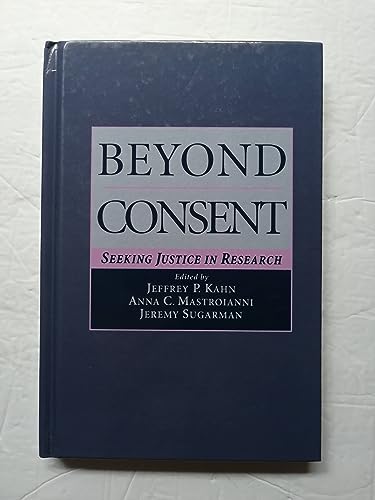Beyond Consent: Seeking Justice in Research - Hardcover

Beyond Consent examines the concept of justice and its application to human subject research through the different lenses of important research populations: children, the vulnerable sick, captive and convenient populations, women, people of color, and subjects in international settings. To set the stage for this examination, and introductory chapter addresses the evolution of research policies. After a look at specific subject populations, the authors discuss the concept of justice for research with human subjects in the future and analyze justice throughout the research enterprise.
"synopsis" may belong to another edition of this title.
This book carefully examines each of these aspects of justice in research. Historical reviews and critical commentaries address the need to expand access to potentially beneficial research for vulnerable sick persons, women, children, specific racial or ethnic groups, and such captive populations as prisoners, other institutionalized persons, military personnel, and students. With the AIDS pandemic and new experimental treatments for otherwise fatal diseases, many patients who might previously have been reluctant to participate in research now want or even demand to be included.
Growing concern about exploitation has intensified efforts to ensure that the harms and benefits of research are fairly distributed, and this balance is being considered in relation to exploited or marginalized groups of people, as well as individuals. The vexing question of how to conduct international collaborative research without exploitation and in accord with universal requirements is thoughtfully discussed. This book suggests that progress will be made when all participating countries contribute to the setting of priorities for collaborative work and other aspects of international research.
A transformed, balanced model of research ethics is emerging, which in some ways is more sensitive to the needs of marginalized persons and in other ways is potentially more harmful to them. New institutional review processes promote attention to nondiscrimination in the selection of research subjects and to their empowerment, but these changes may conflict with the desire to protect vulnerable persons. How and by whom should studies be designed, who should be included in them, how should the risks and benefits be determined, what should be the criteria for terminating trials early, what is the relevance of research to the population being studied, and what are the implications of study findings for the provision of care to the research subjects and the population they represent? The debate over all these questions is reshaping research ethics.
The penultimate chapter of this book merits special mention, since it offers insights into theoretical rationales for reconsidering demands for justice in medical research. This chapter discusses the implications of the shift in the focus of justice from individual research subjects to the groups they represent. The complex implications of such a shift for considerations of justice both in the broad political domain and in the formulation of health policy are addressed.
Caution is necessary in accepting these developments. First, despite the high priority given to informed consent, there has been a regrettable tendency to underplay or ignore it, even in some enlightened societies. Second, given the complexity of the concept of justice and the variations in how it is applied, there is a great risk that under the cover of an alleged benefit to society, the needs of researchers and international drug companies will eclipse the best interests of vulnerable persons.
Controversial, changing conceptions of justice in the research setting should also encourage an examination of injustice at the global level. Research is an integral component of health care, and concern about health is a global issue with implications for everyone. For these reasons, there is a need to supplement procedural justice (which is principally concerned with fairness in applying rules that pertain to persons) with social justice (which incorporates the notion of protecting vulnerable groups and attending to public welfare) by distributing resources in relation to justifiable needs. Widening disparities in wealth, health, and disease should be acknowledged as major global challenges. The reemergence of earlier infectious diseases and the appearance of new diseases that threaten populations throughout the world have been interpreted by some as symptoms of an unjust world in which complex forces widen the disparities in income distribution. In 1994, high-income countries accounted for 89 percent of worldwide health care expenditure but for only 16 percent of the world's population and only 7 percent of the world's burden of disease. Beyond Consent: Seeking Justice in Research stimulates the reader to consider the lack of sustainability of this situation.
Reviewed by Solomon R. Benatar, M.D.
Copyright © 1999 Massachusetts Medical Society. All rights reserved. The New England Journal of Medicine is a registered trademark of the MMS.
"About this title" may belong to another edition of this title.
- PublisherOxford University Press
- Publication date1998
- ISBN 10 0195113535
- ISBN 13 9780195113532
- BindingHardcover
- Edition number1
- Number of pages190
- EditorKahn Jeffrey P., Mastroianni Anna C., Sugarman Jeremy
Buy New
Learn more about this copy
Shipping:
FREE
Within U.S.A.
Top Search Results from the AbeBooks Marketplace
Beyond Consent: Seeking Justice in Research
Book Description Hardcover. Condition: New. Seller Inventory # DADAX0195113535
BEYOND CONSENT: SEEKING JUSTICE
Book Description Condition: New. New. In shrink wrap. Looks like an interesting title! 0.9. Seller Inventory # Q-0195113535
Beyond Consent: Seeking Justice in Research
Book Description Hardcover. Condition: New. Seller Inventory # Abebooks11915

